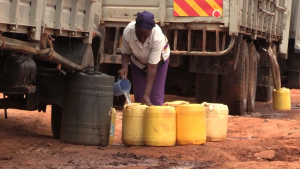
A local fetches water oozing from a sand-ferrying truck. Residents of Kiambeere ward wait for these trucks at Mutuobare market to fetch water for domestic use.
BY MUGENDI KANGICHU
Walking the streets at Mutuobare market in Kiambeere as early as 5 am, one is bound to bump into locals carrying empty containers.
They are on their way to Kiambeere Dam to fetch water, but all too aware they are wading in dangerous territory.
The Kiambere is one of the most likely places for one to die, as it is infested with crocodiles, hippos, but that does not deter them from going for the all too important resource.
A few said they have to make their way to the dam early, because, after a long period of observation, they discovered early morning is advisable before the animals have stretched their jaws and are become active.
But the more plausible explanation is that the dam is far from their homes and they have to start out early to get the commodity, for various uses, including in local hotels and other commercial activities.
“A few have met their deaths here, shredded into pieces by the crocs. Walking to the dam in biting cold and the likelihood of being torn into pieces by a crocodile sends shivers along our spines, but water is life and we have to have it,” said Peter Mwaniki, a local.
Simon Manyaja was thrown into mourning after a crocodile attacked his wife, who had, as usual, made the dawn visit to draw water, unaware of a shadow as the crocodile lurked, because of the darkness.
“I cover 20 kilometers to and from Kiambeere dam where I draw water. It means I have to start the journey very early. Some wake up as early as 4 am, it illustrates how the problem of access to water is for us,” said Mr. Manyaja.
Manyaja says his wife went to the dam when a crocodile lunged from beneath the water and threw her flailing into the deep waters, never to emerge alive, leaving him with a two-month baby to fend for.
“Before getting into the dam to fetch water, we have made it a habit to throw stones in, to detect the presence of the crocs or to scare them away. She was alone and was not quick enough when the crocodile came for her, as she bent to fetch water. Many people have lost their loved ones in these waters,” Manyaja said, with sadness written on his face.
Peninah Nduku told Mashariki news her husband escaped death by a whisker not long ago when a croc just managed to lock its jaws around the jerrican he had dipped in the water.
“The crocodile bit the jerrican and my husband’s reflexes saved his skin, otherwise he would be dead,” she said.
Young men with carts pulled by donkeys fetch water for those who are unable to make the long walk, including the elderly, sick, families and those who are busy.
Sand transporters also carry large volumes of water, she adds.
Nduku says: “The old and the sickly and those who do not have donkeys tap drops of water oozing from sand-ferrying lorries. Loaded trucks make a stop at Mutuobare market where residents use gutters to tap the water from the wet sand,” she said.
Charles Maina, a truck driver, says each lorry stops at Mutuobare market for at least three hours for the locals, mainly women, who can get the water.
“Women come with own gutters and connect them on the side of a lorry to tap the drops of water. We park the trucks on a slopy area so that the water can drain on one side for the locals to fetch easily,” said Maina.
He reveals that locals get up to 30 containers of 20-liter jerricans from a single truck.
On arrival at Mutuobare market where trucks are packed, we find tens of women waiting for the next truck, with their gutters at the ready.
Maina tells us that for one to be a ‘beneficiary’ of the next truck, there is a lot of pushing and shoving as they scramble for water, and punctuated with a lot of noise.
It only underlines the scarcity and resultant scramble for the water, he chuckles.
“Some people come from far and there is always a risk of missing out, it is survival for the fittest as nobody wants to go back home without the valued commodity. Thousands of locals get water from about 35 trucks which stop here daily,” he reveals.
Elizabeth Kalunda, a mother of five, says she is aware the water oozing from the trucks is not the best for drinking but they have no option.
“Truth is said, this water is not safe for drinking. Yes, our health is at risk. There is no toilet in the area where sand is fetched posing the question and it is possible there is open defecation, but what can we do?
Locals reveal that people go without taking a bath for more than a week regardless of the fact that the ward is at the center of Seven Folks Hydroelectric dams.
They regret local politicians use water scarcity as a campaign tool, yet they do not address the issue once they get elected.




